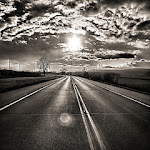
During the early 1930s, Thomas Dorsey created gospel music -- the African American religious music which married secular blues to a sacred text. Under the name “Georgia Tom” he performed with blues artist Ma Rainey and her Wild Cats Jazz Band. He wrote over 400 compositions, but it is for “Take My Hand, Precious Lord” that he is best known.
Dorsey was the son of a Baptist preacher; his mother was the church organist. Throughout his early years he felt torn between the sacred and the secular. At eleven, he left school to take a job at a local vaudeville theater. Six years later, Dorsey left Atlanta for Chicago. He was part of the Great Migration north. In Chicago, Dorsey found success almost immediately. He was known as the “whispering piano player,” called to perform at after-hours parties where the pianist had to play quietly enough to avoid drawing police attention.
At twenty-one, his hectic and unhealthy schedule led to a nervous breakdown. He convalesced back home in Atlanta. There, his mother admonished him to stop playing the blues and “ serve the Lord.” He ignored her and returned to Chicago, playing with Ma Rainey. He married his sweetheart, Nettie Harper. But in 1925, a second breakdown left Dorsey unable to play music.
After his recovery three years later, Dorsey committed himself to composing sacred music. However, mainstream churches rejected his songs. Then, in August 1932, Dorsey’s life was thrown into crisis when his wife and son died during childbirth. In his grief, he turned to the piano for comfort. The tune he wrote, “Take My Hand, Precious Lord,” came, he says, direct from God. Dorsey co-founded the National Convention of Gospel Choirs and Choruses in 1933. Six years later, he teamed with Mahalia Jackson, and the team ushered in what was known as the “Golden Age of Gospel Music.” Dorsey himself became known as the father of gospel music. He died in 1993.


